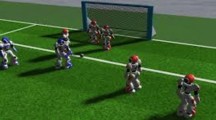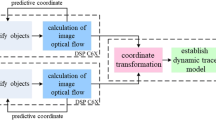Abstract
In the robot soccer competition platform, the current confrontation decision-making system suffers from difficulties in optimization and adaptability. Therefore, we propose a new self-adaptive decision-making (SADM) strategy. SADM compensates for the restrictions of robot physical movement control by updating the task assignment and role assignment module using situation assessment techniques. It designs a self-adaptive role assignment model that assists the soccer robot in adapting to competition situations similar to how humans adapt in real time. Moreover, it also builds an accurate motion model for the robot in order to improve the competition ability of individual robot soccer. Experimental results show that SADM can adapt quickly and positively to new competition situations and has excellent performance in actual competition.
Similar content being viewed by others
Explore related subjects
Discover the latest articles and news from researchers in related subjects, suggested using machine learning.References
Ros R, Arcos J L, Lopez deMantaras R. A case-based approach for coordinated action selection in robot soccer. Artificial Intelligence, 2009, 173: 1014–1039
Ahmadi M, Stone P, Instance-based action models for fast action planning. In: Visser U, Ribeiro F, Ohashi T, Dellaert F, eds. RoboCup 2007: robot soccer world cup XI. Heidelberg: Springer Verlag, 2008: 1–16
Zhang L, Shi H B, Wu J B. Applying intelligent confrontation decisionmaking system to robot soccer based on improved cbr(case-based reasoning). Journal of Northwestern Polytechnic University, 2013(6): 991–996
Hwang K S, Jiang W C, Yu H H, Lin S Y. Reinforcement learning in zero-sum markov games of robot soccer systems. Mobile Robots, 2011: 289–308
Kleiner A, Dietl M, Nebel B. Towards a life-long learning soccer agent. RoboCup 2002: robot soccer world cup VI. Springer, 2003: 126–134
Jolly K, Ravindran K, Vijayakumar R, Sreerama Kumar R. Intelligent decision making in multi-agent robot soccer system through compounded articial neural networks. Robotics Autonomous System, 2007, 55(7): 589–596
Nakashima T, Takatani M, Udo M, Ishibuchi H, Nii M. Performance evaluation of an evolutionary method for robocup soccer strategies. RoboCup 2005: robot soccer world cup IX. Springer, 2005: 616–623
Konur S, Ferrein A, Ferrein E, Lakemeyer G. Learning decision trees for action selection in soccer agents. In: Proceedings of the Workshop on agents in dynamic and real-time environments. Valencia: IOS Press, 2004
Aamir A, Lima P. Multi-robot cooperative spherical-object tracking in 3D space based on particle filters. Robotics and Autonomous Systems, 2013, 61(10): 1084–1093
Wu J, Snašel V, Ochodkova E, Martinovic J, Svaton V, Abraham A. Analysis of strategy in robot soccer game. Neurocomputing, 2013, 109: 66–75
Berger R, G. L mel, Exploiting past experience-case-based decision support for soccer agents. In: Proceedings of KI 2007: Advances in artificial intelligence (German National AI Conference, KI). 2007(4667): 440–443
Ahmad A. An integrated bayesian approach to multi-robot cooperative perception. 2013
Lau N, Lopes L S, Corrente G, Fillpe N. Multi-robot team coordination through roles, positionings and coordinated procedures Intelligent, In: Proceedings of IEEE/RSJ International Conference on Robots and Systems. 2009: 5841–5848.
Nadarajah S, Sundaraj K. A survey on team strategies in robot soccer: team strategies and role description. Artificial Intelligence Review, 2013, 40(3): 271–304
Song D L, Wu B W, Li X F, Chen L P, Liu C J. Research on distancefirst based role assignment strategy of soccer robot//Robot intelligence technology and applications 2012.Springer Berlin Heidelberg, 2013: 793–800
Mota L, Reis L P, Lau N. Multi-robot coordination using setplays in the middle-size and simulation leagues. Mechatronics, 2011, 21(2): 434–444
De Cooman G, Hermans F. Imprecise probability trees: bridging two theories of imprecise probability. Artificial Intelligence, 2008, 172: 1400–1427
Lin F J, Hung Y C, Tsai M T. Fault-tolerant control for six-phase PMSM drive system via intelligent complementary sliding-mode control using TSKFNN-AMF. IEEE Transactions on Industrial Electronics, 2013, 60: 5747–5762
Geramifard A; Redding J How J P. Intelligent cooperative control architecture: a framework for performance improvement using safe learning. Journal of Intelligent & Robotic Systems, 2013, 72: 83–103
Juan C N, Penya A E, Yoseba K. Intelligence distribution for data processing in smart grids: a semantic approach. Engineering Applications of Artificial Intelligence, 2013(26): 1841–1853
Li S A, Hsieh M H, Ho C Y, Chen K H, Lin C Y, Wong C C. Task allocation design for autonomous soccer robot. In: Omar K, Nordin M J, Vadakkepat P, eds. Intelligent robotics systems: inspiring the NEXT. Berlin Springer, 2013: 297–308
Author information
Authors and Affiliations
Corresponding author
Additional information
Haobin Shi received his PhD from Northwestern Polytechnical University, China in 2008. He is an assistant professor in the School of Computer Science at Northwestern Polytechnic University, China. He is the director of the Chinese Association for Artificial Intelligence. His current research interests include intelligent robots, decision support systems, artificial intelligence, multi-agent robot systems, and machine learning.
Lincheng Xu is a masters candidate in theoretical and computational fluid dynamics in Northwestern Polytechnical University, China. His research interests focus on robotic mechanical modeling, computational fluid dynamics, and nonlinear optimization.
Lin Zhang received his MSc in computer science from Northwestern Polytechnical University, China in 2013: where he is currently a PhD candidate. His research direction includes embedded systems, and artificial intelligence.
Wei Pan received his PhD from Northwestern Polytechnical University, China in 2008. He is an assistant professor in the School of Computer Science at Northwestern Polytechnic University, China. His current research interests include intelligent robots, and multi-agent robot systems.
Genjiu Xu received his PhD from Northwestern Polytechnical University, China in 2008. He is an associate professor in School of Computer Science at Northwestern Polytechnic University, China. He is an executive member of the Committee on game theory of Operations Research Society of China. His current research interests include operations research, game theory, and mechanism design.
Rights and permissions
About this article
Cite this article
Shi, H., Xu, L., Zhang, L. et al. Research on self-adaptive decision-making mechanism for competition strategies in robot soccer. Front. Comput. Sci. 9, 485–494 (2015). https://doi.org/10.1007/s11704-015-4210-7
Received:
Accepted:
Published:
Issue Date:
DOI: https://doi.org/10.1007/s11704-015-4210-7




